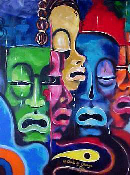Emotions can be a great source of richness in our lives. However, when faced with overpowering negative emotions like sadness, guilt, fear and anger, our lives can seem overwhelming.
Most of us have never learned to deal with our emotions. Instead, as Sheri Van Dijk notes in The Dialectical Behavior Therapy Skills Workbook: Using DBT to Regain Control Of Your Emotions and Your Life:
Generally, if you’re experiencing an uncomfortable emotion, you don’t want it to stick around. That’s because it’s uncomfortable, of course. Ironically, this desire to get rid of unpleasant emotions can cause you to behave in ways that cause the emotion to stick around or even to become more intense.
Some of the most common ways we try to get rid of unpleasant emotions are by problems solving them, fighting or attempting to control our emotions, or trying to suppress or avoid them completely. In this post we’ll look at what happens when you try to problem-solve your emotions.
 Most of us learn from an early age how to think logically and solve problems rationally, and so it’s natural that we try to use thinking and logic to solve our emotional problems. However, emotions are not something we can rationalize and think our way out of.
Most of us learn from an early age how to think logically and solve problems rationally, and so it’s natural that we try to use thinking and logic to solve our emotional problems. However, emotions are not something we can rationalize and think our way out of.





Wow this is a great resource.. I’m enjoying it.. good article
Thanks for the great post